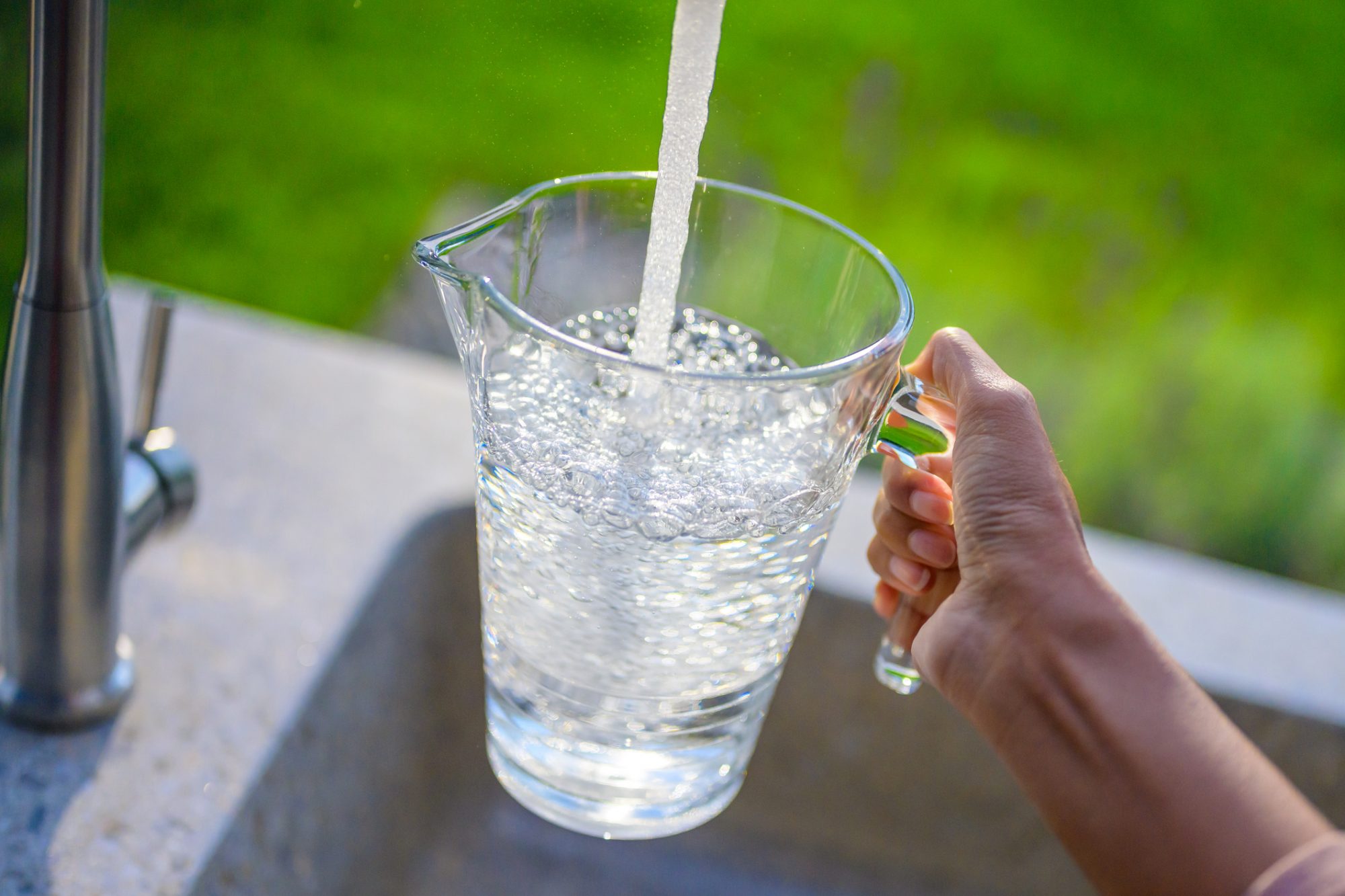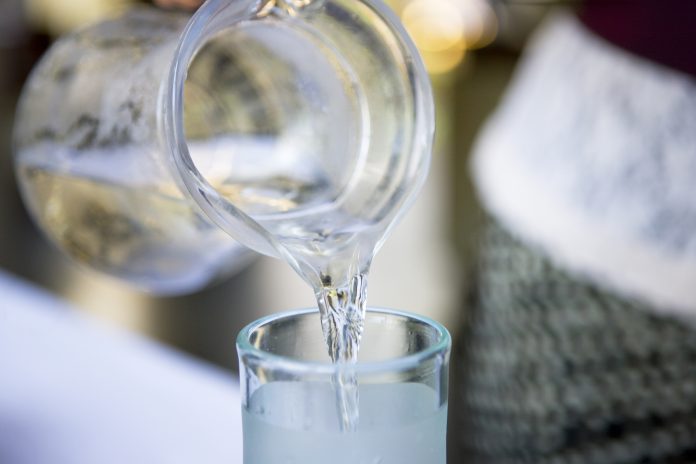Only 53% of UK adults are drinking enough water, according to Water Logic. Yet being just 1% dehydrated has serious implications for our health. Here are 10 reasons to drink more water along with some tips and tricks
In the hot summer, the increase in water loss as we sweat, trying to keep cool, makes the situation even worse. It’s vital we all increase our water intake.
Here are ten reasons to drink more water and why it’s good for your health.
-
Keep healthy and live longer
In a recent 2023 study, 15,752 men and women aged 45-66 years, were followed up for 25 years. Those with low levels of hydration – assessed by their blood sodium levels – had a 50% increased risk of being older than their biological age, and a 39% increased risk of developing chronic disease. A 20% increased risk of premature mortality was noted in those with the highest levels of sodium (144 mmol or above).
Hypohydration results in raised sodium levels. However, most people are unaware they are dehydrated because the symptoms and signs are subtle. Being underhydrated is caused by not drinking enough water, and losing too much water by sweating, which is made worse in hot weather.
Drinking more water is an easy thing to do, to stay healthy, by reducing the risk of chronic diseases and prolonging the lifespan.
-
Prevent high blood pressure
Chronic dehydration raises your blood pressure. Around 60% of your blood volume is made up of water. Your body has a finely tuned mechanism for conserving water when it detects a deficiency. It releases anti-diuretic hormone (ADH) which works in the kidneys to lower the amount of water passing out in the urine. But ADH also causes constriction of arteries and veins, and this causes raised blood pressure.
Research studies have shown that being underhydrated also has other harmful effects. It increases inflammation, impairs endothelial function (the ability of blood vessels to constrict and relax) and affects arterial stiffness (the rigidity of the arterial wall).

-
Improve cognitive function
75% of the brain is water. It needs water for all its metabolic and physiologic processes and as a transport medium for essential chemicals and neurotransmitters. Without enough water, neuronal function starts to deteriorate, and cognitive (thinking) processes are impaired.
In fact, just 2% dehydration results in a decrease in cognitive ability. Yet most people are unaware they are dehydrated. Common symptoms are tiredness, dizziness, and ‘brain fog.’ They may have shorter concentration spans, poorer memory and recall and delayed reaction times. Women appear to be more sensitive to these effects of dehydration than men.
Staying well-hydrated has been shown to improve cognitive performance and mood.
-
Speed up weight loss
A low water intake is a probable risk factor for obesity. In a 2016 observational study of 9,528 adults aged 18064 years, 32.6% were found to be dehydrated.
Those who were dehydrated had a 79% increased chance of having a higher BMI and a 59% increased risk of being obese, as compared to adults who were adequately hydrated.
This may be for several reasons.
- Many people confuse the cue for thirst as a cue for hunger and eat when actually they should be drinking. Having a glass of water before meals is often suggested to help people lose weight.
- Overweight and obese people tend to eat foods with a higher salt content, meaning they need extra water to balance their electrolytes.
- People with a raised BMI need more water to be well-hydrated than those with a normal BMI. The authors gave the example of a 5ft10 man weighing 160 pounds (normal weight) as compared to a 5ft10 man weighing 210 pounds (obese). The man with the heavier BMI would need an extra 1 litre of water per day to fulfil his body requirements. Many health professionals do not realise this. The authors commented that those with a higher BMI need to drink more than the often-quoted 2 litres per day.
-
Improved mental health
In a 2018 cross-sectional study which included 3,327 adults, those who drank 2 glasses of water per day or less had double the risk of depression, as compared to those who drank 5 or more glasses of water per day. Low water intake was also linked to increased anxiety symptoms.
As to why this should be, the authors gave the following comments –
- The fact that a lower water intake increases the risk of depression and anxiety is likely to be due to its effect on the body’s metabolism and physiological processes, as with other chronic diseases.
- Drinking more water was linked to healthier lifestyle behaviours.
- Those with a higher water intake also had better nutritional intake from their diet, in particular a higher intake of riboflavin, magnesium, pyridoxine and cobalamin, all of which are essential for the production of brain neurotransmitters.
- Drinking water switches off the sympathetic nervous system (SNS) and lowers adrenaline output. Activation of the SNS via the hypothalamopituitary axis (HPA axis) is thought to be an underlying cause of psychotic depression.
Research in rats has shown that without enough water, the brain can’t make enough serotonin, the happy hormone responsible for mood.
Dehydration stimulates the stress response, stimulating the SNS and worsening symptoms of anxiety and depression.
-
Perimenopausal symptoms improved
Women with menopausal symptoms may be interested to know that being better hydrated is likely to improve them. Common menopausal symptoms include headaches, lack of energy, mood swings, difficulty concentrating, brain fog, joint pains, urinary symptoms and dry skin, hair and nails. These are the same symptoms as being dehydrated. Being properly hydrated should help improve them.
Menopausal women are at increased risk of water loss because they often experience hot flushes and night sweats, meaning they lose more fluid through perspiration. When severe, these hot flushes can occur 40-50 times a day, and night sweats can occur frequently overnight, and be drenching, needing to get out of bed, have a shower and change the bedding. Some women will also be having heavy, prolonged periods of vaginal bleeding which can also contribute to dehydration.
At the time of the perimenopause, estrogen levels fall by 90%. Estrogen is a hormone which tends to help women conserve fluid.
-
Increased fertility
It’s often not appreciated that dehydration affects fertility. In men, being dehydrated reduces the volume and the quality of semen. In women, dehydration is linked to poorer quality of the egg, less cervical mucus and impaired transport of the sperm to the egg within the fallopian tube.
Once a pregnancy does occur, blood volume increases very quickly to meet the needs of the developing embryo. When pregnant, the mother’s metabolism is increased, which requires more water for nutrition, and the transport, breakdown and removal of toxins.
-
Better bone health
Osteoporosis is a silent killer. You only know you have it when you have a fracture – and then it’s almost too late. The key is to prevent osteoporosis and keep your bones strong and healthy as possible. Water plays a vital role in bone health as it does in the rest of the body. Your bones may be hard, but in fact they contain 30% water.
Just 2% dehydration stimulates the production of cortisol and adrenaline, which are known to hasten bone loss. Cortisol has the following actions –
- It impairs the absorption of calcium from the intestine.
- It inhibits the reabsorption of calcium in the renal tubules so that more calcium passes out in the urine.
- It stimulates osteoclasts – cells which carry out the process of removing dead bone cells.
To help maintain your bone mineral density (BMD) it’s vital to increase your water consumption and not risk being dehydrated.
-
Ensuring and maintaining healthy kidneys
The kidney is one of the main organs in your body associated with the excretion of metabolic byproducts. Dehydration leads to can damage kidney function. Because the urine is more concentrated, there is an increased risk of kidney stones and urinary tract infections. Acute dehydration causes kidney failure.
-
Care for your eyes
Don’t forget that being dehydrated affects your whole body – including your eyes. One common effect of being dehydrated is dry eye. This means your eyes feel dry and irritated, you keep wanting to rub them, you may often think there is something in your eye, your vision may be blurred, or you could have double vision. Also, you are likely to have an increased sensitivity to light.
1 in 3 UK adults suffers from dry eye and numbers are on the increase. Unless it is treated, dry eye can lead to eye infections, corneal abrasions and ulcers, and this can ultimately affect your vision.
If you suspect you could have dry eye, see an Optician without delay. But it’s vital to be drinking enough water.

Tips and tricks on how to improve your water intake
- Fill a jug or a water bottle and have it beside you all day. Take sips regularly and often. Make it more interesting by adding lemon, lime or ice. Tap water is fine. There is no advantage to fizzy mineral water, but you can drink this if you prefer.
- Get into the habit of drinking 2 large glasses of water when you wake up every morning, and then one glass at coffee time, and before lunch, tea and dinner. Have another glass of water around 2 hours before bedtime. Drink even if you don’t feel thirsty.
Get into the habit of drinking 2 large glasses of water when you wake up every morning
- Keep drinking tea and coffee as usual – these do count towards your daily fluid intake – but don’t add sugar.
- Don’t drink sugary drinks – soda, juices, sports drinks and energy drinks. The sugar in the drinks causes water to move out of the cells and into the bloodstream, meaning you then pee it out. This makes you more dehydrated.
- Carbonated sugar-free drinks are fine so long as you don’t overdo it. There are concerns about a high intake of artificial sweeteners.
- Keep alcohol and caffeine to a minimum as both function as diuretics and make you lose more water.
- Even those with bladder problems should drink more water.
- Eat foods with a high water content such as cucumber, celery, lettuce, watermelon, apples, peaches, courgettes and tomatoes.
Eat foods with a high water content
- Note that eating a lot of fibre – and we should all be eating at least 30g of fibre per day – draws water into the gut, hence you need to increase your water intake. Chia seeds – very high in fibre – are known to swell in the gut as they absorb up to 27 times their weight in water!
- Consider the use of a water-tracker app.
Drink more water
Drinking more water is something we can easily do to improve our health. It’s simple, inexpensive and makes total sense. 50% of GP appointments and 70% of hospital admissions are for chronic diseases. The number of people with more than one chronic condition has been rising. Could we help reverse these statistics simply by drinking more water?
For more information
This piece was written and provided by Dr Deborah Lee, Dr Fox Online Pharmacy











